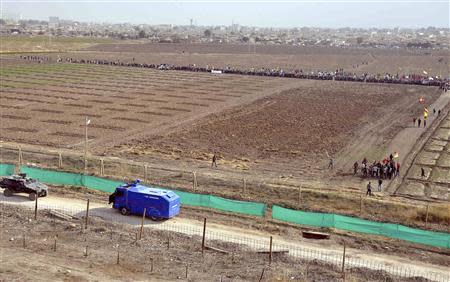Kurds protest against wall along Turkey's border with Syria
By Daren Butler NUSAYBIN, Turkey (Reuters) - Thousands of Kurds protested on Thursday against Turkish plans to build a wall along the Syrian border, calling it a move to stop Kurdish communities strengthening cross-frontier ties as Syria splinters from civil war. The rally underscored the sectarian strains spilling over from Syria's war, which grew out of a 2011 uprising against President Bashar al-Assad and has fragmented into a patchwork of antagonistic ethnic and sectarian pockets that risk destabilizing neighboring Middle Eastern countries. Riot police tolerated the protests, organized by Turkey's pro-Kurdish Peace and Democracy Party (BDP), for much of the day but fired tear gas to disperse groups of demonstrators as a sit-down protest began following the main speeches. Crowds of mostly young men, many waving red, yellow and green Kurdish flags, gathered in the Turkish town of Nusaybin, separated from the Syrian town of Qamishli by a strip of no-man's land and barbed wire fencing. Officials said last month that Turkey would build a two-meter high wall to stop people bypassing checkpoints and prevent smuggling near Qamishli, where Kurdish fighters, Syrian rebel units and Arab tribes have regularly clashed. BDP leader Selahattin Demirtas told the crowds that the government had promised to abandon the plans, but said the protests should continue until the border was fully open to trade. He accused Turkey of backing radical Islamists fighting against Kurdish groups in Syria. "Our protests will continue until government support for these gangs is halted," he said. Syrian Kurds say they have taken ground from Islamist rebels in Syria's northeast in recent weeks, tightening their grip on an area close to the Turkish border where they have been seeking to establish autonomous rule. Their assertiveness has posed a quandary for Turkey as it tries to make peace on its own soil with militants from the Kurdistan Workers Party (PKK), which has fought for greater Kurdish autonomy in Turkey for three decades. Ankara has long championed more robust backing for Syria's fractious armed opposition, but it has denied supporting al Qaeda-linked groups among their ranks such as Jabhat al-Nusra and the Islamic State of Iraq and the Levant (ISIL). "It is out of the question that groups like al Nusra and al Qaeda can take shelter in our country," Prime Minister Tayyip Erdogan said during an official visit to Stockholm on Thursday. MISTRUST Turkish officials have played down the measures being taken along the border near Nusaybin. Deputy Prime Minister Bulent Arinc said earlier this week the intention was simply to lay more barbed wire to tighten security. Turkey is sheltering around a quarter of the two million people who have fled Syria's two-and-a-half-year-old conflict and has pledged to maintain its open-door policy to refugees. But the plans raised suspicions among Kurdish communities that the government had a sectarian agenda, something officials in Ankara have been at pains to deny. "You see how they divide Kurdistan," said Bahattin Ozbek, 46, a BDP mayoral candidate who travelled 200 km (124 miles) from the eastern city of Mus to attend the demonstration. "We want to unite with our ethnic kin and get rid of this border," he said, pointing to a line of riot police, flanked by water cannon and armored vehicles along the barbed wire fence. The Syrian conflict has complicated Turkey's efforts to make peace with the PKK, designated a terrorist group by Ankara, the United States and European Union but for the past year engaged in a peace process with the Turkish state. The border gate on the edge of town is officially closed to trade, although locals are allowed to cross carrying small amounts of tea, cigarettes and fuel. The BDP says ambulances and flour mills destined for Syrian Kurds have been held up on the Turkish side of the border for months. But smugglers frequently cross through gaps in the barbed wire elsewhere along the border, local residents say. Construction workers with excavators have begun digging foundations in Nusaybin for the wall, which would span just a fraction of the 900-km (560-mile) border. The barrier is only a temporary security measure, a Turkish government official said. (Writing by Nick Tattersall)



